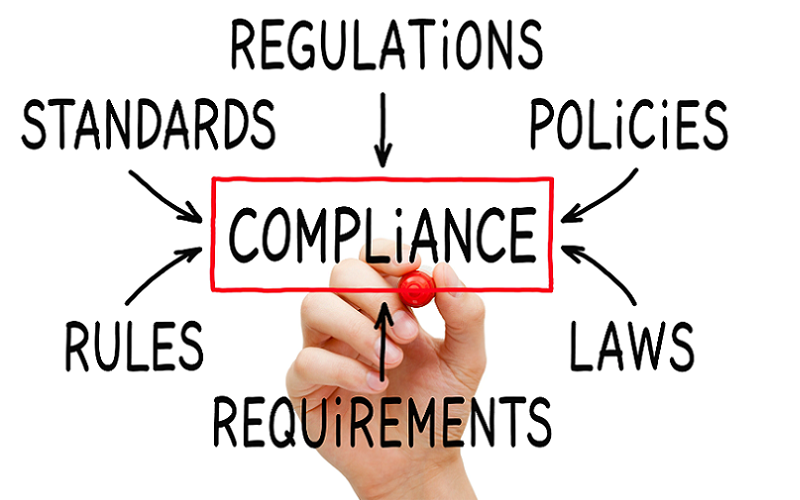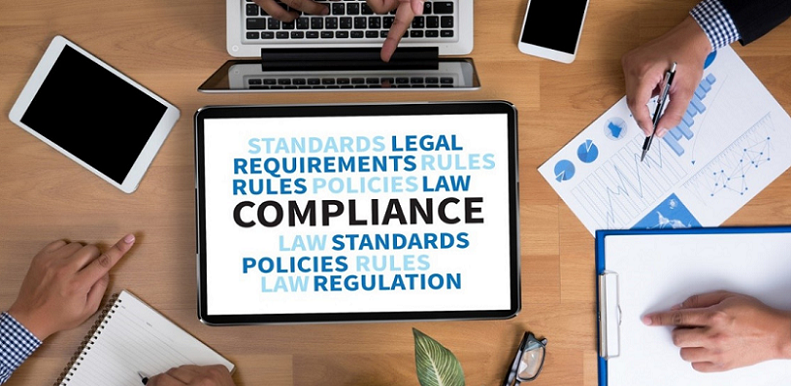
When embarking on the thrilling journey of starting a new business, it’s easy to get swept up in the excitement and overlook some of the critical components that ensure your business runs smoothly and lawfully. Legal compliance might not be the most riveting aspect of entrepreneurship, but it is undeniably one of the most essential. Here we aim to equip aspiring entrepreneurs and small business owners with the knowledge and tools needed to establish a business that’s not just successful, but also adheres to the legal standards and regulations.
Contents
- Introduction to Business Legal Compliance
- The Necessity of Business Legal Compliance
- Understanding Business Structures
- Business Registration and Licensing
- Legal Compliance in Human Resources
- Business Financial Legal Compliance
- References
Introduction to Business Legal Compliance
Entrepreneurship is an exciting and rewarding path, but it’s not without its challenges. One of the key aspects that new business owners must navigate is the complex world of legal compliance. Not staying within the legal lines can lead to severe consequences, including fines, loss of reputation, and even the closure of the business.
Brief Overview of Legal Compliance
Legal compliance refers to ensuring that a business operates in accordance with all applicable laws, regulations, and standards. This includes, but is not limited to, adhering to employment laws, maintaining financial records, protecting consumer data, and complying with health and safety regulations. It’s a multifaceted domain that requires attention and diligence.
Importance of Understanding Legal Structures for New Businesses
Selecting a legal structure for your new business is one of the first and most critical decisions you will make. Your choice will impact how much you pay in taxes, your ability to raise capital, the paperwork you need to file, and your personal liability. Therefore, understanding the various legal structures available and aligning them with your business goals is imperative for the sustainable growth and success of your venture.
The Necessity of Business Legal Compliance
Keeping on the right side of the law is essential for various reasons. Understanding these reasons will not only highlight the importance of legal compliance but also provide you with the motivation to make it an integral part of your business planning and operations.
Protecting Your Business and Reputation
The reputation of a business is one of its most valuable assets. Consumers today are well-informed and conscious of the businesses they patronize. A business that is known for operating ethically and within the confines of the law is more likely to gain the trust of customers and stakeholders [1]. Legal compliance helps in:
- Building Consumer Trust: Ensuring that your business complies with consumer protection laws, data protection, and quality standards helps in building trust among your customers.
- Attracting Investors: Investors are more likely to invest in a business that has a good compliance record, as it minimizes their risk.
- Protecting Against Legal Actions: Compliance with laws and regulations reduces the risk of lawsuits and legal actions which can be costly and damage your reputation.
Avoiding Costly Penalties and Lawsuits
Running afoul of laws and regulations can lead to fines, penalties, and even legal action. This can have a devastating impact, especially on a new business.
- Financial Impact: Penalties and fines can be substantial and can cripple a new business financially. In addition, the cost of legal representation can be significant.
- Time and Resources: Legal actions can be time-consuming, diverting critical time and resources away from running and growing the business.
- Long-Term Consequences: Some violations can result in long-term consequences such as the loss of licenses and permits, which can effectively put a business out of operation.
Ensuring Sustainable Growth
Legal compliance is not just about avoiding negative consequences; it’s also about laying a solid foundation for the sustainable growth of your business.
- Efficient Operations: Having well-defined legal processes and adhering to regulations can lead to more efficient business operations.
- Employee Satisfaction: Compliance with employment laws can result in a more satisfied and productive workforce.
- Competitive Advantage: A strong compliance record can be a competitive advantage, particularly in industries where trust and credibility are important.

Understanding Business Structures
Selecting the right business structure is pivotal, as it will impact various aspects of your business, including taxes, liability, ownership succession, and more. Here, we will provide an overview of the different types of business structures, helping you weigh the pros and cons of each and make an informed decision that aligns with your business goals and values.
Defining Different Business Structures
There’s no one-size-fits-all solution when it comes to choosing a business structure. The choice depends on various factors including your industry, size, and business objectives. Here, we define the common types of business structures [2].
Sole Proprietorship
- Definition: A business owned and run by a single individual.
- Characteristics: The owner has total control, claims all profits, and is personally liable for all debts and obligations.
Partnership
- Definition: A business owned by two or more people who agree to share profits and losses.
- Characteristics: Partners contribute to all aspects of the business and share in profits and losses according to the terms of the partnership agreement.
Limited Liability Company (LLC)
- Definition: A hybrid structure that combines features of a corporation and a sole proprietorship or partnership.
- Characteristics: Offers liability protection to owners (called members) and allows profits to be passed through to members without corporate taxes.
Corporation
- Definition: A legal entity separate from its owners (shareholders), which can make a profit, be taxed, and be held legally liable.
- Characteristics: Owners have limited liability for business debts and actions. It can raise capital through the sale of stock.
Non-profit Organization
- Definition: A business organized for purposes other than generating profit.
- Characteristics: Exempt from paying income tax on earnings. Profits must be reinvested in the organization’s purpose.
Co-operative
- Definition: A business owned and operated for the benefit of its members.
- Characteristics: Members have an equal say in decision-making and share profits.
Comparing Business Structures
With a basic understanding of different business structures, it’s crucial to delve deeper into how they compare to each other on various fronts.
Liability Protection
- Sole Proprietorships and Partnerships have the least amount of protection, with personal assets potentially at risk.
- LLCs and Corporations provide more extensive protection of personal assets.
- Non-profits and Co-operatives vary based on specific statutes and organizational structure.
Taxation
- Sole Proprietorships, Partnerships, and LLCs are typically subject to pass-through taxation, where profits are taxed on the owner’s personal income tax return.
- Corporations are taxed separately from their owners, which can lead to double taxation of profits.
- Non-profits are exempt from income tax on earnings related to their exempt purposes.
Management and Ownership
- Sole Proprietors have complete control over the business.
- Partnerships share control according to their partnership agreement.
- LLCs can have flexible management structures.
- Corporations have a more structured management, with a board of directors overseeing the major business decisions.
- Co-operatives are democratically controlled by their members.
Funding Opportunities
- Corporations can raise capital through selling stocks.
- LLCs, Partnerships, and Sole Proprietorships can obtain funds through loans and personal contributions.
- Non-profits can apply for grants and receive donations.
- Co-operatives can raise funds through member contributions.

Business Registration and Licensing
Having chosen the ideal legal structure for your business, the next step in ensuring legal compliance involves the registration and licensing of your venture. This is a critical phase, as operating without the necessary permits can have serious legal repercussions.
Registering Your Business Name and Structure
One of the first steps in launching your business is registering its name and structure. This is vital for establishing your business’s legal identity [3].
- Choosing a Business Name: Select a unique name that is not already in use. Ensure that it complies with your state’s naming rules.
- Registering with State Authorities: Register your business name and structure with the relevant state agency, usually the Secretary of State’s office.
- Obtaining an Employer Identification Number (EIN): This is like a Social Security number for your business, and it’s necessary for tax purposes and hiring employees.
Obtaining Federal and State Business Licenses
Depending on the nature and location of your business, you may need various licenses and permits.
- Federal Licenses: Certain business activities are regulated by federal agencies, and you may need to obtain federal licenses. For instance, if you are selling alcohol or firearms, you will need specific federal licenses.
- State Licenses: Different states have different licensing requirements. Check with your state’s business licensing office to determine which licenses are required for your business.
Specialized Permits for Certain Industries
Certain industries have specialized requirements and may need additional permits [4].
- Health and Safety Permits: If you’re in the food service industry, for example, you’ll need health permits.
- Zoning and Land Use Permits: Make sure that your business complies with local zoning laws. This is especially important for home-based businesses.
- Environmental Permits: If your business could have an environmental impact, you may need specific permits related to air and water pollution, waste management, and the use of toxic substances.
Regular Renewal and Reporting Obligations
After obtaining the required licenses and permits, you must stay informed of any renewal deadlines and reporting obligations.
- License Renewals: Keep track of the expiration dates of your licenses and permits, and ensure timely renewals.
- Reporting Obligations: Depending on your business structure, you may be required to file annual reports or other periodic documentation with state authorities.
- Changes in Business: Report any changes in your business such as name, address, or structure to the relevant authorities in a timely manner.

Legal Compliance in Human Resources
As your business takes shape, you may find yourself in a position where you need to hire employees. Human resources (HR) is an area that is heavily regulated, and compliance in this domain is essential for the smooth functioning of your business. Not only does it protect your business from lawsuits and fines, but it also contributes to a positive workplace culture.
Compliant Hiring Practices
The hiring process is the first touchpoint between your business and its employees. Ensuring that this process is compliant with the law is crucial.
- Non-discrimination: Ensure that your hiring practices comply with anti-discrimination laws. This includes making decisions without regard to race, gender, age, disability, or other protected characteristics.
- Background Checks: If you conduct background checks, ensure that they are compliant with the Fair Credit Reporting Act (FCRA) and relevant state laws.
- Employment Eligibility Verification: Use Form I-9 to verify that each new hire is legally eligible to work in the United States.
Employee Compensation and Benefits
Once you have hired employees, complying with laws regarding their compensation and benefits is paramount.
- Minimum Wage and Overtime: Comply with federal, state, and local minimum wage laws, and ensure that overtime is paid according to the Fair Labor Standards Act (FLSA).
- Employee Benefits: If you provide benefits such as health insurance or retirement plans, make sure that they comply with relevant laws such as the Affordable Care Act (ACA) and the Employee Retirement Income Security Act (ERISA).
Workplace Safety and Health
Creating a safe and healthy work environment is not just an ethical responsibility; it’s a legal one [5].
- Occupational Safety and Health Act (OSHA): Ensure that your workplace complies with OSHA standards, which set forth requirements for maintaining a safe working environment.
- Reporting and Recordkeeping: Keep records of workplace injuries and illnesses, and report them as required by OSHA.
- Employee Training: Provide employees with training on safety practices and procedures.
Employee Privacy and Data Protection
In the digital age, protecting employee data is increasingly important.
- Data Privacy Laws: Comply with state and federal data privacy laws to ensure the confidentiality and security of employee personal information.
- Employee Records: Keep employee records secure and only allow access to authorized personnel.
Managing Employee Departures
Handling employee departures in a legally compliant manner is essential for reducing the risk of legal disputes.
- Final Pay: Ensure that departing employees receive their final pay, including any accrued vacation or overtime, in accordance with state laws.
- Exit Interviews and Agreements: Conduct exit interviews to obtain feedback, and if necessary, use separation agreements to minimize legal risks.
Business Financial Legal Compliance
Managing the financial aspects of your business in accordance with legal requirements is imperative to maintain your business’s good standing and avoid penalties or legal issues.
Understanding Tax Obligations
One of the most critical aspects of financial legal compliance involves understanding and fulfilling your business’s tax obligations.
Federal Taxes
Income Tax: Ensure that your business files an annual income tax return.
Self-Employment Tax: If you’re self-employed, you must pay self-employment tax to cover Social Security and Medicare.
Employment Taxes: If you have employees, you have additional tax obligations, including withholding income taxes and paying Social Security, Medicare, and unemployment taxes.
State and Local Taxes
Depending on your location, you may have state and local taxes, such as sales tax, property tax, and franchise tax.
Recordkeeping
Keep accurate and complete financial records for your business to support your tax filings.
Complying with Accounting Standards
Proper accounting is not just good practice—it’s often a legal requirement.
Generally Accepted Accounting Principles (GAAP)
If your business is publicly-traded or in certain regulated industries, you may be required to follow GAAP, a set of accounting principles that standardize financial reporting.
Audits and Financial Statements
Depending on the size and nature of your business, you may be required to have your financial statements audited or to submit regular financial reports to regulatory agencies.
Anti-Money Laundering (AML) and Fraud Prevention
Especially if your business is in the financial sector, compliance with anti-money laundering laws and fraud prevention is crucial.
Know Your Customer (KYC)
Verify the identity of your clients and understand the nature of their business to ensure that your services are not being used for money laundering or other illicit activities.
Reporting Suspicious Activities
Report any suspicious transactions or activities to the appropriate authorities as required by law.
Managing Business Credit and Loans
If your business relies on credit or loans, it’s important to understand the legal obligations that come with them.
Understanding Loan Agreements
Thoroughly understand the terms of any loan agreements, including repayment schedules, interest rates, and covenants.
Credit Reporting Laws
If you report information to credit bureaus or use credit reports in your business, ensure compliance with the Fair Credit Reporting Act (FCRA) and similar laws.
References
[1] Business Guide: Stay legally compliant
[2] Legal Compliance for Small Business Owners
[3] New and Small Businesses
[4] Business Compliance: A Guide for Entrepreneurs
[5] 8 Legal Requirements When You Start A Business
